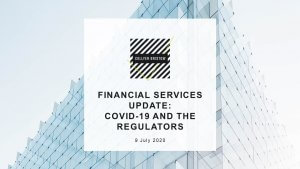- Banking & financial disputes
- Financial services

Shorter Reads
High Court grants retrospective permission allowing use of disclosed documents to obtain US legal advice
Robin Henry and Jean-Martin Louw comment on the turn of the ECU v HSBC in regards to the Disclosed Documents.
2 minute read
Published 20 November 2018
Key information
Earlier this year, Collyer Bristow reported on a Commercial Court decision [1] in which The ECU Group Plc (“ECU”) was granted pre-action disclosure of various documents relating to suspected “front-running” by HSBC (“the Disclosed Documents”).
In an interesting turn of events, ECU’s use of that material was recently called into question, when it sought the Commercial Court’s permission to allow certain “collateral uses” of the Disclosed Documents.
The application
The Civil Procedure Rules stipulate that, except where a court otherwise gives permission, disclosed documents may be used “only for the purpose of the proceedings in which [they were] disclosed” (CPR 31.22(1)).
Where pre-action disclosure is concerned, “the proceedings” in relation to which disclosed documents may be used will be those contemplated to be commenced in the relevant court.
ECU applied to Mr Justice Baker to give (amongst other things) “retrospective permission” for its past use of the Disclosed Documents in obtaining separate legal advice from US attorneys.
Whilst the two US firms involved had not seen the actual documents, their content, and the analysis of them by ECU’s London legal team, was shared with them for the purpose of obtaining advice:
- as to the availability of claims in the US, in particular, against HSBC Bank USA; and
- in respect of other possible actions in the US, and guidance in respect of dealings with the US authorities.
In considering whether retrospective permission ought to be granted, the Judge said it was clear that deploying the Disclosed Documents for the purpose of actual or contemplated proceedings in another jurisdiction is “collateral use”. However, he noted that ECU could have, without breaching the collateral use rule (and without seeking permission), obtained the same advice from US attorneys, upon materially the same brief, for the purpose of existing English Commercial Court proceedings.
The question of where ECU might bring a claim against HSBC Bank USA (or other US based individuals) was a question that the Judge considered could properly be investigated by ECU for the purpose of deciding what claims to bring in the existing Commercial Court proceedings. Such an investigation would include taking advice from US attorneys as to potential causes of action under US law. The Judge considered that if the purpose in obtaining advice as to US law were thus confined, there would be no collateral use.
Accordingly, notwithstanding that ECU had admitted seeking the US law advice for the purpose of potential claims in another jurisdiction, the court was prepared to grant limited retrospective permission for ECU’s prior use of the Disclosed Documents to obtain that advice, but only insofar as the advice could or would be used for the purpose of contemplated proceedings before the Commercial Court.
Strict conditions were, however, attached to that permission, including:
- termination of ECU’s existing retainers with the US law firms, which (without the court’s permission) were not to be instructed again in connection with the subject matter of the proceedings;
- confirmation on oath from ECU’s London lawyer (i.e. by affidavit) as to the nature and extent of the US law advice obtained (without waiver of privilege) and the use made of the Disclosed Documents in seeking that advice; and
- payment of HSBC’s costs on an indemnity basis.
Comment
Whilst this case serves as a timely reminder that parties to litigation must ensure that any disclosed documents are only used for the purpose of proceedings in which they are disclosed, litigants can take some comfort from the Commercial Court’s decision that no breach will occur where it is necessary to use disclosed documents for the purpose of taking foreign law advice that is relevant to the existing English proceedings.
The ECU Group Plc v HSBC Bank Plc & Ors [2018] EWHC 3045 (Comm)
________________________________________
[1] The ECU Group Plc v HSBC Bank plc [2017] EWHC 3011 (Comm)
Related content
Shorter Reads
High Court grants retrospective permission allowing use of disclosed documents to obtain US legal advice
Robin Henry and Jean-Martin Louw comment on the turn of the ECU v HSBC in regards to the Disclosed Documents.
Published 20 November 2018
Associated sectors / services
Authors
Earlier this year, Collyer Bristow reported on a Commercial Court decision [1] in which The ECU Group Plc (“ECU”) was granted pre-action disclosure of various documents relating to suspected “front-running” by HSBC (“the Disclosed Documents”).
In an interesting turn of events, ECU’s use of that material was recently called into question, when it sought the Commercial Court’s permission to allow certain “collateral uses” of the Disclosed Documents.
The application
The Civil Procedure Rules stipulate that, except where a court otherwise gives permission, disclosed documents may be used “only for the purpose of the proceedings in which [they were] disclosed” (CPR 31.22(1)).
Where pre-action disclosure is concerned, “the proceedings” in relation to which disclosed documents may be used will be those contemplated to be commenced in the relevant court.
ECU applied to Mr Justice Baker to give (amongst other things) “retrospective permission” for its past use of the Disclosed Documents in obtaining separate legal advice from US attorneys.
Whilst the two US firms involved had not seen the actual documents, their content, and the analysis of them by ECU’s London legal team, was shared with them for the purpose of obtaining advice:
- as to the availability of claims in the US, in particular, against HSBC Bank USA; and
- in respect of other possible actions in the US, and guidance in respect of dealings with the US authorities.
In considering whether retrospective permission ought to be granted, the Judge said it was clear that deploying the Disclosed Documents for the purpose of actual or contemplated proceedings in another jurisdiction is “collateral use”. However, he noted that ECU could have, without breaching the collateral use rule (and without seeking permission), obtained the same advice from US attorneys, upon materially the same brief, for the purpose of existing English Commercial Court proceedings.
The question of where ECU might bring a claim against HSBC Bank USA (or other US based individuals) was a question that the Judge considered could properly be investigated by ECU for the purpose of deciding what claims to bring in the existing Commercial Court proceedings. Such an investigation would include taking advice from US attorneys as to potential causes of action under US law. The Judge considered that if the purpose in obtaining advice as to US law were thus confined, there would be no collateral use.
Accordingly, notwithstanding that ECU had admitted seeking the US law advice for the purpose of potential claims in another jurisdiction, the court was prepared to grant limited retrospective permission for ECU’s prior use of the Disclosed Documents to obtain that advice, but only insofar as the advice could or would be used for the purpose of contemplated proceedings before the Commercial Court.
Strict conditions were, however, attached to that permission, including:
- termination of ECU’s existing retainers with the US law firms, which (without the court’s permission) were not to be instructed again in connection with the subject matter of the proceedings;
- confirmation on oath from ECU’s London lawyer (i.e. by affidavit) as to the nature and extent of the US law advice obtained (without waiver of privilege) and the use made of the Disclosed Documents in seeking that advice; and
- payment of HSBC’s costs on an indemnity basis.
Comment
Whilst this case serves as a timely reminder that parties to litigation must ensure that any disclosed documents are only used for the purpose of proceedings in which they are disclosed, litigants can take some comfort from the Commercial Court’s decision that no breach will occur where it is necessary to use disclosed documents for the purpose of taking foreign law advice that is relevant to the existing English proceedings.
The ECU Group Plc v HSBC Bank Plc & Ors [2018] EWHC 3045 (Comm)
________________________________________
[1] The ECU Group Plc v HSBC Bank plc [2017] EWHC 3011 (Comm)
Associated sectors / services
- Banking & financial disputes
- Financial services
Authors
Need some more information? Make an enquiry below.
Subscribe
Please add your details and your areas of interest below
Article contributors
Robin
HenryPartner - Head of Dispute Resolution Services
Specialising in Banking & financial disputes, Commercial disputes, Corporate recovery, restructuring & insolvency, Financial regulatory and Personal insolvencyJean-Martin
LouwAssociate
Specialising in Commercial disputes, Banking & financial disputes, Commercial arbitration and Financial regulatory
Enjoy reading our articles? why not subscribe to notifications so you’ll never miss one?
Subscribe to our articlesMessage us on WhatsApp (calling not available)
Please note that Collyer Bristow provides this service during office hours for general information and enquiries only and that no legal or other professional advice will be provided over the WhatsApp platform. Please also note that if you choose to use this platform your personal data is likely to be processed outside the UK and EEA, including in the US. Appropriate legal or other professional opinion should be taken before taking or omitting to take any action in respect of any specific problem. Collyer Bristow LLP accepts no liability for any loss or damage which may arise from reliance on information provided. All information will be deleted immediately upon completion of a conversation.
Close










































































